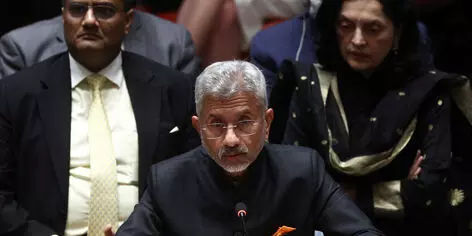
Jaishankar seeks UNSC reform citing India's role as world's vaccinator
text_fieldsUnited Nations: India's External Affairs Minister S. Jaishankar on Wednesday strongly argued for Security Council reforms saying that the world order has changed as evidenced in the covid crisis.
S. Jaishankar cited India's role in becoming the world's vaccinator in the Covid pandemic to demonstrate how the world order has changed requiring Security Council reforms.
He warned that the failure of the Council reform process to make progress is creating intense frustration among member nations even as the global crises and changing world order cry out for change.
Without mentioning India, he said that the world has changed dramatically since 1945 as seen in the provision of the Covid vaccines, the bulk of which came from India for distribution around the world, especially to developing countries, rather than from the older traditional Western sources.
"The diversification of the global production (of the vaccine) was itself a recognition of how much the old order has changed," he said.
While there is broad support for reforms reiterated several times by world leaders, it has been stymied by the nature of the Intergovernmental Negotiation (IGN) process to implement it, he said.
"This is creating an intense sense of frustration among the wider membership," he said.
Jaishankar presided over a high-level ministerial meeting of the Council on New Orientation for a Reformed Multilateral System or NORMS, which focused on Council reforms, but also touched on other the need for change in other international organisations.
"While the debate on reforms has meandered aimlessly, the real world meantime has changed dramatically," he said "in terms of the economic prosperity, technology capabilities, political influence and developmental progress".
"The broader dispersal of capabilities and responsibilities has been expressed for example, in the emergence of the G20," he added.
India took over the presidency of the G20, the group of major industrialised nations and emerging economies.
Outlining the reasons for the failure of the IGN so far, he said that it is the only such process in the UN without a timeframe for accomplishing its goals and it is also hampered by not having a negotiating text or records of its proceedings, he said.
"There are suggestions that negotiations can only start when consensus has been achieved," he said. "Surely, we cannot have a more extreme case of putting the cart before the horse."
A small group of nations, led by Italy and including Pakistan, has blocked the adoption of a negotiating text that could set the agenda till a consensus is first reached.
"Attempts to propose piecemeal changes will not be accepted by them as a solution," Jaishankar added.
On the challenge of terrorism, he said that "even as the world is coming together with a more collective response, multilateral platforms are being misused to justify and protect perpetrators".
IANS with inputs

















